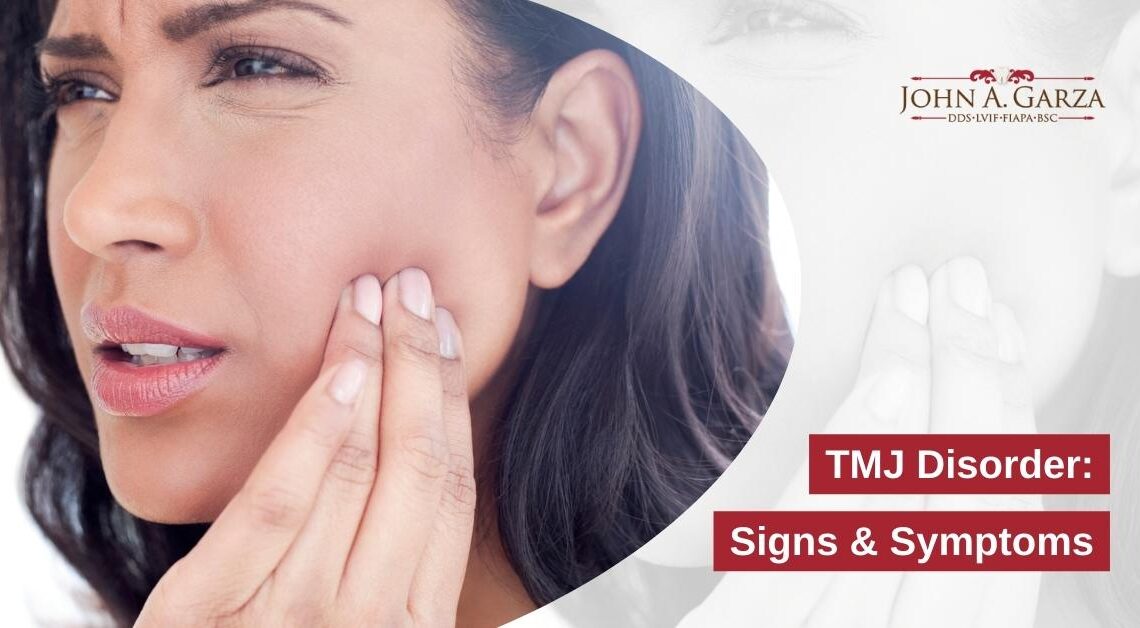TMJ Disorder: Signs & Symptoms
TMJ pain is frequently caused by the temporomandibular joint (TMJ), the hinge-like joint between your upper and lower jawbones. TMJ problems emerge when this joint is not functioning properly.
Your temporomandibular joint is a network of ligaments, muscles, discs, and bones that allows you to move your jaw side to side and forward and backward. The pain and difficulty moving your jaw are indicators that there is a problem with this joint.
If you've been having unexplained jaw pain or headaches with no clear cause, you may have a TMJ disorder.
Learn more about TMJ disorder symptoms by reading the article.
What is TMJ disorder
TMJ Association stated that temporomandibular disorders, or TMJ or TMD, are a diverse, under-researched, and poorly understood group of illnesses defined by discomfort in the jaw joint and surrounding tissues typically coupled with jaw movement limitation. As recently discovered, TMJ is a complicated multisystem disorder affecting the circulatory, digestive, endocrine, exocrine, immunological, muscular, neurological, reproductive, respiratory, and skeletal systems. TMJ is no longer viewed as a disorder affecting only the jaws and teeth.
According to scientists, 85 % with TMJ also have other painful and non–painful disorders in different sections of the body. Allergies, chronic fatigue syndrome, chronic headaches, endometriosis, fibromyalgia, interstitial cystitis, irritable bowel syndrome, neck and low back pain, sleep difficulties, and vulvodynia are only a few of these illnesses.
Often, the actual cause of a person's TMJ condition is unknown. Your pain could be caused by several things, including heredity, rheumatoid arthritis, or a jaw injury. Specific individuals who experience jaw pain also tend to clench or grind their teeth (bruxism); however, many clench or grind their teeth regularly without developing TMJ issues.
Most of the time, the pain and discomfort associated with TMJ issues are temporary and can be relieved with self-care or nonsurgical treatments. Surgery is generally reserved for patients who have failed to improve with conservative approaches. However, some persons with TMJ issues may benefit from surgical treatment.
TMJ Signs and Symptoms
Broken, cracked, or worn-down teeth
An imbalance occurs in the bite if the jaw joints, muscles, and teeth do not act together. It is possible to have a misalignment between your upper and lower teeth, resulting in worn, cracked, or shattered teeth. Because TMJ issue sufferers tend to clench or grind their teeth, this can lead to worn, cracked, or broken teeth as well. If your dentist notices evidence of damage on your teeth from clenching and grinding, they'll likely let you know during routine cleanings.
Locking of jaw
A person may feel limited jaw movement or jaw locking. Limited movement may obstruct the mouth from fully opening or the jaw moving in specific directions. This can result in discomfort in daily life. A change in the lower and upper teeth fit also a possible sign.
Facial pain
When the temporomandibular joint is inflamed, it can also produce pain in other areas of the face, including the cheeks, beneath the eyes, and even the forehead. TMJ pain can be a vicious circle: muscle tension can produce TMJ pain, and then TMJ pain can generate additional muscle tension across the face.
Other symptoms include:
- When you open and close your mouth, you may hear clicking or popping sounds.
- A dull discomfort in the jaw muscles
- Tenderness or pain in the jaw joint
- Tenderness or pain in the jaw joint that worsens during the day
- Complications with chewing
- Discomfort while chewing
- Pain in the area of your ears
- Acute discomfort caused by muscular spasms
- Frequent headaches of the tension type
- Changes in the fit of your upper and lower teeth
- Neck and shoulder pain during speaking or chewing
Risk Factors
Additionally, it's essential to know who is most at risk for developing TMJ and how to prevent it. TMJ issues can be brought on by a variety of factors, including:
- Rheumatoid arthritis, osteoarthritis, and other types of arthritis
- Teeth grinding or clenching for an extended period
- Serious damage to the jaw
- Fibromyalgia
- Facial and cranial deformities
TMJ pain can be caused by stress. Stress and worry can profoundly affect the body's physiology, even if you don't recognize it. Perhaps your teeth grind while you sleep, or your jaw clenches as you work on your computer. You may not even be aware that you do this. The muscles surrounding the temporomandibular joint might become tense due to stress. Not only does this complicate matters, but it also produces numerous physical conditions that in turn lead to TMJ dysfunction.
This doesn't mean that treatment for the TMJ issue is impossible, but it may require a bit more trial and error to identify the cause. TMJ treatment providers who take the time and effort to understand your symptoms and devise a unique treatment plan for you are essential.
Stress-related behaviors can bring on TMJ issues. It's possible that stress-related behaviors like biting your nails, gum, or straws can increase your risk.
Additionally, age and gender have a significant impact in deciding who is most vulnerable. TMJ problems are most common in adults between the ages of 20 and 40. Women are more likely to suffer from this condition. If you're worried about developing TMJ, make an appointment with your dentist.
Contact Garza DDS to learn more about TMJ disorder symptoms
Seek medical treatment if you experience chronic jaw discomfort or tenderness or cannot completely open or close your jaw. Your physician, dentist, or TMJ expert can discuss potential reasons and remedies for your condition. Garza DDS is committed to provide a lasting solution to your chronic TMJ symptoms. Get in touch with us today.


